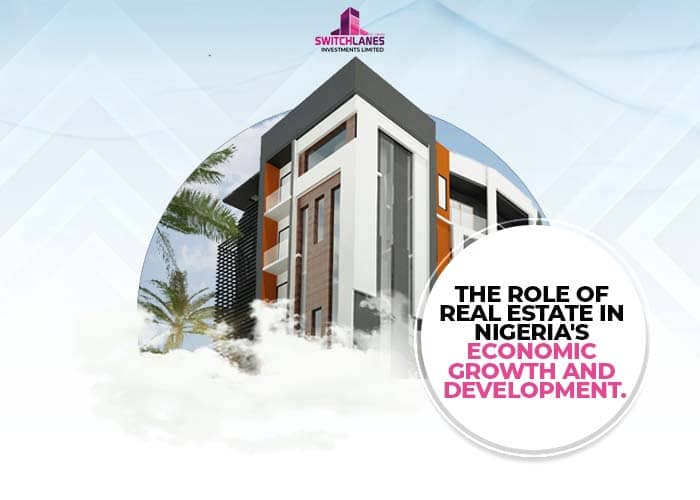Nigeria, located in West Africa, is the most important economic system on the continent and plays a good sized position in Africa’s economic landscape. With a populace of over 200 million people, Nigeria boasts plentiful natural resources, together with oil, fuel, minerals, and agricultural products. Nigeria’s economy is varied, with sectors with oil and fuel, agriculture, production, telecommunications, and offerings contributing to its GDP and the role of Real Estate in Nigerias Economic Growth and Development.
Nigeria’s oil and fuel industry has traditionally been a primary driver of its economic system, accounting for a substantial element of presidency revenue and export income. However, efforts are being made to diversify the financial system and decrease dependence on oil by selling sectors such as agriculture, production, and technology.
As the biggest economy in Africa, Nigeria serves as a nearby financial powerhouse, attracting foreign direct investment and playing a crucial role in alternate and commerce inside the continent. Nigeria’s economic rules, infrastructure development, and business-pleasant surroundings contribute to its importance in Africa’s economic panorama.
But, Nigeria additionally faces challenges, including poverty, unemployment, and earnings inequality. Efforts are being made to deal with those issues and sell inclusive economic growth and development.
Overall, Nigeria’s economic system holds monstrous capacity and maintains to adapt, offering opportunities for funding, entrepreneurship, and economic development not only inside Nigeria but also within the broader African vicinity.
Real Estate as a Key Economic Sector
The real estate region in Nigeria performs a pivotal position within the country’s economy, contributing appreciably to its GDP and generating employment opportunities. The sector encompasses diverse activities, consisting of residential, business, and business real property development, property management, and real estate investment.
The contribution of the actual property area to Nigeria’s GDP is massive. In step with the National Bureau of Statistics, real estate and production they accounted for 6.49% of Nigeria’s GDP within the 2d sector 2021. This highlights the arena’s importance in driving financial growth and development.
The estate sector additionally serves as a primary supply of employment in Nigeria. It creates direct employment opportunities via production sports, belongings management, and real property company services. Additionally, it generates oblique employment in associated manufacturing, finance, and services industries. The sector’s labour-in-depth nature affords job possibilities for an extensive range of skilled and unskilled workers, contributing to poverty reduction and socio-financial development.
Examples of real property projects and investments riding monetary increase in Nigeria are the Eko Atlantic City and the Lekki free exchange zone. Eko Atlantic City is a significant waterfront improvement in Lagos, attracting local and worldwide investments. It has created employment opportunities, inspired monetary activities, and located Lagos as a global enterprise hub. The Lekki-free alternate sector in Lagos is a unique financial zone promoting industrialization, change, and investment. It has attracted huge investments in production, logistics, and services, contributing to activity creation and economic boom.
These examples demonstrate how real estate initiatives and investments may have a transformative impact on Nigeria’s financial system, riding growth, creating employment opportunities, and attracting neighborhood and overseas investments.
Infrastructure Development and Real Estate
Infrastructure improvement and real property have a symbiotic relationship, with every influencing and making the most of the opposite. Infrastructure refers to the bodily systems and systems that aid economic and social activities, such as roads, bridges, transportation networks, utilities, and public facilities. Actual property, however, encompasses the development, possession, and management of houses, consisting of residential, commercial, and commercial homes.
Advanced infrastructure has an enormous effect on property values and funding opportunities in the real property region. When infrastructure is evolved or upgraded in an area, it enhances connectivity, accessibility, and comfort, making the location more ideal for both citizens and agencies. For instance, the development of recent roads or the growth of present transportation networks can reduce commuting time and enhance access to key regions, inclusive of enterprise districts, academic establishments, and leisure centers. This increased accessibility can result in better call for for houses in those areas, driving up belongings values.
Moreover, improved infrastructure can open up previously underdeveloped or faraway areas for actual estate improvement. For instance, the construction of new highways or the established order of transportation hubs can stimulate monetary activities and attract investments in those areas. This, in flip, creates opportunities for real property developers to build residential, commercial, and blended-use homes to cater to the developing call for.
Moreover, progressed infrastructure can beautify the general exceptional of life in a place, making it extra attractive for citizens and agencies. Access to reliable utilities, such as power, water, and telecommunications, is critical for actual property improvement. Areas with properly-advanced infrastructure tend to have better property values and appeal to more funding because of the provision of crucial offerings.
The connection among infrastructure improvement and actual property is at the same time useful. Progressed infrastructure complements belongings values by way of growing accessibility, connectivity, and comfort, making locations extra perfect for residents and agencies. It also opens up new areas for real estate development, stimulating monetary increase and funding possibilities. Therefore, making an investment in actual estate in regions with progressed infrastructure can offer promising returns and long-term boom capability.
Real Estate as an Investment Avenue
Real property is certainly a feasible funding choice in Nigeria, supplying potential for both capital appreciation and apartment earnings. Nigeria’s developing population, urbanization, and growing middle elegance have contributed to a growing demand for housing and industrial homes, making actual estate an appealing funding road.
One of the key blessings of investing in real estate is the capacity for capital appreciation. Through the years, assets values in Nigeria have usually proven an upward fashion, specially in important towns like Lagos, Abuja, and Port Harcourt. This appreciation can be attributed to factors together with population growth, restrained deliver of land, and infrastructure development. As demand keeps to outpace supply, belongings charges are probably to rise, supplying traders with the possibility to earn full-size returns on their investments.
Further to capital appreciation, real property investments in Nigeria can generate apartment income. The call for for condominium residences remains high, specially in city areas wherein many humans choose to hire instead of purchase houses. This demand is pushed by elements which includes the excessive cost of homeownership, the transient nature of some activity roles, and the desire for flexibility among younger specialists. Through investing in residential or industrial houses and leasing them out, traders can earn a steady circulate of condominium earnings, that could provide a dependable supply of coins drift.
But, it’s vital to notice that making an investment in actual estate also comes with certain risks and demanding situations. Those include the capacity for property market fluctuations, legal and regulatory troubles, and the want for correct assets management. It is vital for buyers to behavior thorough research, searching for professional advice, and carefully check the marketplace dynamics earlier than making any funding decisions.
Average, actual property funding in Nigeria offers the capability for capital appreciation and condo profits. With the u . S .’s growing populace and urbanization developments, the call for for residences is expected to stay sturdy. But, it’s essential for investors to technique real estate funding with warning, behavior due diligence, and stay knowledgeable approximately market developments to maximize their chances of fulfillment.
Real Estate and Urbanization
Actual property performs a important function inside the method of urbanization and metropolis improvement. As urban areas make bigger and populations grow, the demand for housing, industrial areas, and infrastructure will increase. Actual property developers and traders play a important position in assembly these demands and shaping the physical panorama of towns.
One of the key roles of real property in urbanization is offering housing solutions. As cities develop, there is a need for low-priced and quality housing for the increasing population. Actual estate developers make contributions to urban development by means of constructing residential buildings and groups that cater to exceptional earnings levels and lifestyles. These tendencies no longer most effective offer refuge but additionally make a contribution to the general livability and sustainability of towns.
Real estate also plays a great function in industrial and combined-use improvement in urban areas. As cities end up financial facilities, there is a demand for workplace spaces, stores, and different commercial facilities. Actual property builders respond to this call for with the aid of constructing office buildings, purchasing department shops, and blended-use traits that integrate residential, industrial, and leisure spaces. Those tendencies make a contribution to the economic boom of cities by using attracting corporations, developing process opportunities, and enhancing the city enjoy for residents.
But, urbanization also gives challenges and possibilities for real estate improvement. One of the challenges is the availability of land. As towns expand, locating suitable land for development will become extra difficult, leading to increased land expenses and opposition. Additionally, urbanization often leads to expanded call for for infrastructure and offerings, inclusive of transportation, utilities, and public facilities. Actual property builders need to don’t forget these elements and paintings intently with nearby authorities to make certain that their tasks align with the town’s improvement plans and make contributions to sustainable urban growth.
Examples of actual estate initiatives contributing to city development in Nigeria are the primary enterprise District (CBD) in Abuja and the Victoria Island development in Lagos. The CBD in Abuja is a deliberate urban place that serves as the commercial and administrative hub of the metropolis. It features high-upward thrust workplace buildings, authorities establishments, and commercial areas, attracting groups and contributing to the monetary increase of the capital city. The Victoria Island development in Lagos is a top waterfront vicinity that has gone through giant transformation in latest years. It’s miles now domestic to luxury residential buildings, industrial facilities, and enjoyment venues, contributing to the urbanization and modernization of Lagos.
These examples highlight how real estate initiatives make a contribution to city improvement with the aid of providing housing, industrial spaces, and infrastructure that aid the increase and livability of towns.
Real Estate and Housing Affordability
Housing affordability is a good sized challenge in Nigeria, specially in urban areas wherein the call for for housing outpaces the supply. The speedy urbanization and population growth in towns like Lagos and Abuja have caused a scarcity of cheap housing alternatives, pushing housing costs past the reach of many people and households.
Several elements make a contribution to the housing affordability challenges in Nigeria. Firstly, the excessive cost of land and production substances drives up the general value of housing. Restricted access to financing options and excessive hobby rates further exacerbate the affordability issue, making it difficult for ability owners to comfortable cheap mortgages. Moreover, insufficient urban making plans and infrastructure improvement make contributions to the shortage of lower priced housing in nicely-related and serviced areas.
Actual property performs a essential role in addressing the housing affordability project in Nigeria. Builders and traders have the opportunity to provide low-cost housing answers that cater to the needs of low and center-profits earners. This will be executed via diverse techniques, which includes:
Authorities Partnerships: real estate builders can collaborate with the authorities to put into effect less costly housing schemes and initiatives. This can contain the allocation of land at reduced costs, tax incentives, and streamlined approval methods. Government assist can assist lessen the overall price of housing and make it extra low-priced for the target populace.
Modern Financing fashions: actual property developers can explore revolutionary financing models to make housing extra affordable. This can encompass rent-to-very own schemes, cooperative housing models, and shared fairness preparations. These techniques provide alternative pathways to homeownership and assist individuals triumph over the financial obstacles associated with upfront prices.
Combined-earnings traits: actual property developers can include mixed-earnings traits that encompass a number of housing options, from low cost gadgets to marketplace-fee residences. Via integrating inexpensive housing inside larger developments, developers can cross-subsidize the value of low priced gadgets with the sales generated from better-priced homes. This technique promotes social integration and guarantees that low cost housing isn’t isolated from different segments of the populace.
Sustainable design and construction: actual estate developers can undertake sustainable layout and construction practices to reduce the overall cost of housing. This includes the use of strength-efficient substances, incorporating renewable energy sources, and implementing value-powerful construction techniques. Those measures can help decrease software charges for residents and make housing more less expensive ultimately.
The actual estate region has a important function to play in offering low cost housing solutions in Nigeria. Via partnering with the government, exploring modern financing fashions, incorporating mixed-income developments, and adopting sustainable practices, real estate builders can make a contribution to addressing the housing affordability challenges and make certain that more individuals and households have access to safe and less costly housing options.
Real Estate and Foreign Direct Investment
Real estate performs a big function in attracting overseas direct funding (FDI) to Nigeria. The actual property sector serves as a key avenue for foreign traders to set up their capital and take part inside the united states’s financial boom. The attractiveness of Nigeria’s actual property market lies in its capability for excessive returns, developing urbanization, and the growing call for for high-quality housing and industrial areas.
Foreign direct funding inside the real property zone has a superb effect on Nigeria’s financial system. Firstly, it brings in sizeable capital inflows, which make contributions to the overall financial development of the us of a. These investments assist finance huge-scale actual property initiatives, such as residential traits, commercial complexes, and infrastructure initiatives, which create employment possibilities and stimulate financial boom.
FDI within the actual estate sector additionally contributes to the growth and modernization of Nigeria’s city regions. Overseas investors carry in understanding, generation, and fine practices in actual property development, that can decorate the nice and performance of production initiatives. This, in flip, improves the city landscape, boosts assets values, and attracts further investments.
Furthermore, FDI in actual property has a multiplier effect on different sectors of the financial system. It generates call for for construction materials, offerings, and associated industries, main to increased financial sports and activity advent. Additionally, overseas investors regularly establish partnerships with neighborhood businesses, fostering information switch, competencies improvement, and era transfer, which can have lengthy-time period blessings for Nigeria’s economic system.
Real property performs a critical function in attracting overseas direct funding to Nigeria. The inflow of FDI inside the actual estate area contributes to monetary growth, activity introduction, and the modernization of urban areas. It brings in capital, know-how, and era, that have a fantastic impact on Nigeria’s economic system and make contributions to the general development of the usa.
Conclusion
In end, the actual estate area plays a essential function in Nigeria’s monetary increase and development. It contributes drastically to the u . S .’s GDP, generates employment opportunities, and drives urbanization and infrastructure development. Actual property projects and investments have the power to convert cities, attract overseas direct funding, and provide lower priced housing solutions.
To in addition harness the capacity of the real property sector, it’s miles essential to encourage endured investment and improvement. This can be completed thru authorities help, which includes favorable guidelines, streamlined approval methods, and incentives for real estate developers and traders. Collaboration between the private and non-private sectors is vital to cope with demanding situations, sell sustainable practices, and make sure the availability of less expensive housing for all segments of the population.
Looking beforehand, the destiny prospects of actual estate in Nigeria’s economy are promising. The country’s growing population, urbanization trends, and growing call for for housing and business spaces create a good environment for actual estate funding. With ongoing infrastructure development, enhancing business weather, and the capability for technological advancements, the actual property sector is poised for further boom and innovation.
In end, the actual property zone in Nigeria is a key driving force of monetary boom and development. It has the ability to shape the bodily panorama of cities, appeal to foreign funding, provide employment possibilities, and cope with housing affordability challenges. Via fostering a conducive surroundings for funding and improvement, Nigeria can unencumber the full capacity of its actual property sector and pave the way for a rich future.



